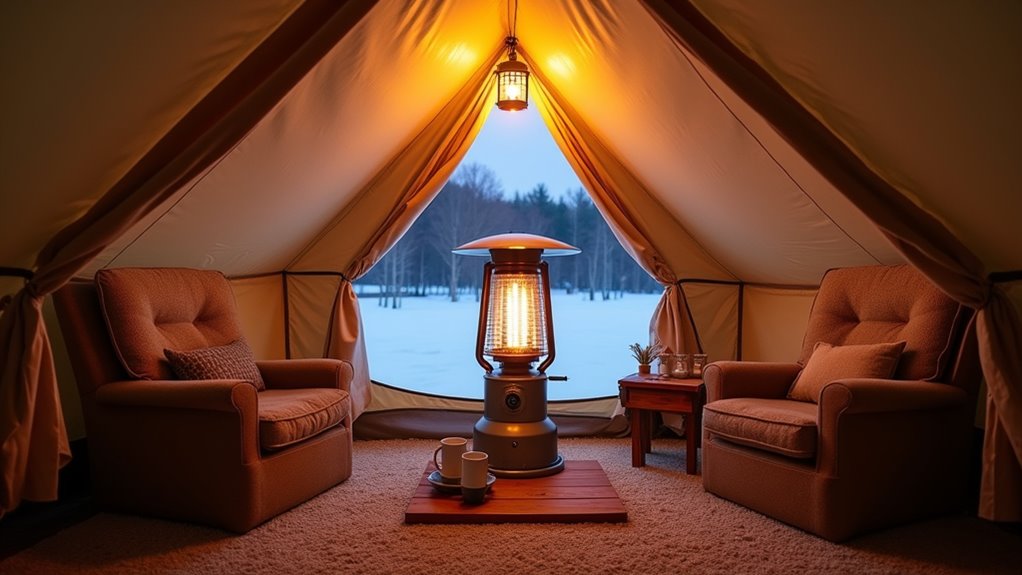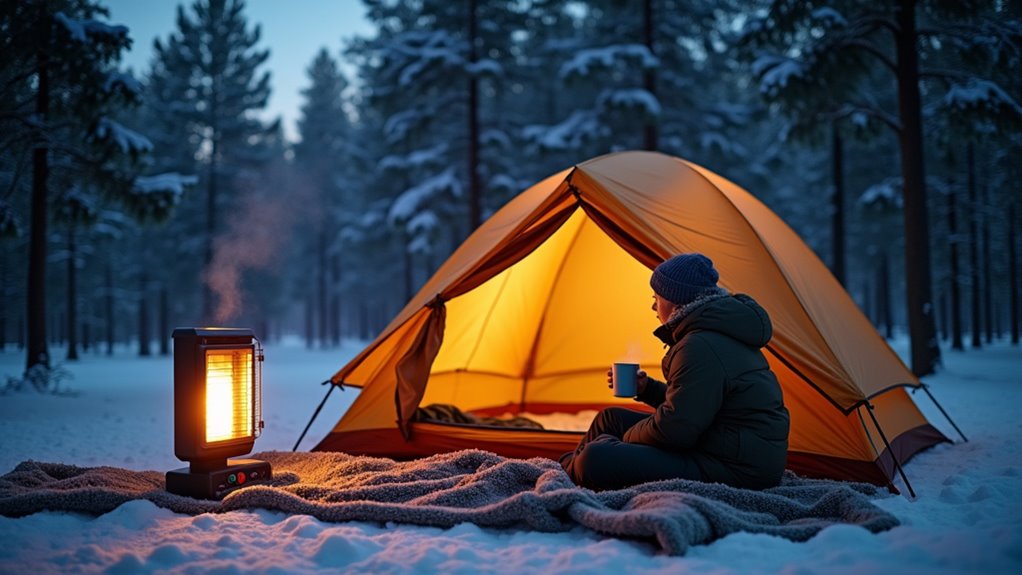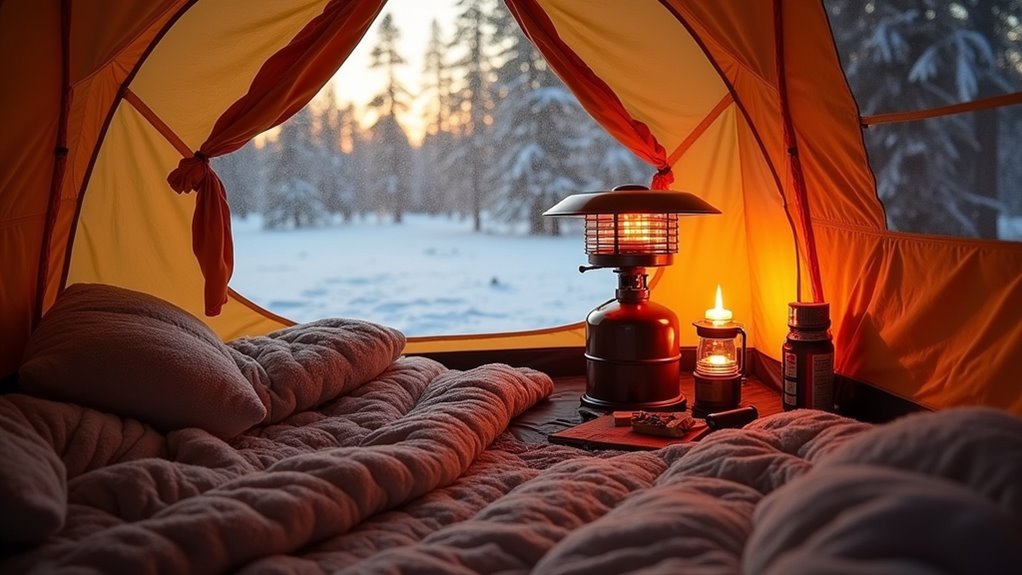How To Heat A Tent
This post contains affiliate links. As an Amazon Associate, we earn from qualifying purchases.
To heat a tent effectively, select an appropriate heater such as a propane or electric model and use insulation techniques to retain warmth. Propane heaters like the Mr. Heater Buddy provide quick, high-output heat but require proper ventilation to avoid carbon monoxide buildup. Electric heaters offer steady, fume-free warmth if you have access to power. Enhancing insulation with Mylar bubble wrap and thermal sleeping pads can also help keep the cold out. Further explanation and additional tips are provided below for those interested in more details.
Essential Facts in 30 Seconds
- Use propane heaters for fast heat, ensuring proper ventilation to prevent carbon monoxide buildup.
- Electric heaters are suitable for powered campsites; confirm power availability before use.
- Insulate tents with Mylar bubble insulation or thermal pads to retain warmth.
- Keep heaters away from flammable materials and supervise them during operation.
- Select heaters with safety features like oxygen sensors and tip-over protection.
Types of Tent Heaters

Heating a tent requires the right heater for comfort and safety. Propane heaters use small tanks, making them easy to carry. They heat up tents quickly. But, they produce carbon monoxide and need good airflow. Use them only in well-ventilated tents.
Electric heaters need power from outlets. This limits their use in remote camping spots. They don’t produce harmful gases, which makes them safer. Electric heaters come in two types: convection and radiant. Each type suits different tent sizes and heating needs. Additionally, considering ground insulation can enhance the effectiveness of your heating method.
Think about your camping style and safety before picking a heater. Choose one that heats well and keeps you safe.
Safety Considerations for Tent Heating
Heating a tent makes camping much more comfortable. Use the right heater to stay safe. Fire risks exist with all heaters, vented or not. Place heaters on solid, non-flammable surfaces. Keep them away from anything that can burn. Always watch the heater while it runs. Stay alert for wildlife activity while using a heater, as unexpected encounters can occur. Turn it off before sleeping or leaving the tent.
Carbon monoxide (CO) is very dangerous. Gas and wood stoves can produce CO inside tents. Keep doors or vents open for fresh air. Use heaters with oxygen sensors to reduce CO risks. Store fuel like kerosene outside the tent. Check for leaks before lighting any fuel. Proper ventilation is crucial for safety when using propane heaters.
Follow these steps to stay warm and safe on your trip.
Heater Performance and Efficiency

Heater performance and efficiency matter for a warm camping trip. BTU output shows how much heat a heater gives off. The Mr. Heater Buddy produces 9,000 BTUs. It heats about 225 square feet well.
Propane heaters like the Mr. Heater MH12B can reach 12,000 BTUs. These work great for bigger tents.
Electric heaters keep heat steady but need power. This limits their use away from electricity.
Battery-powered heaters are easy to carry but give less heat.
Catalytic heaters save energy but warm up slowly.
Butane heaters heat up fast and suit small spaces.
Knowing these facts helps pick the best heater for your trip. Stay warm and enjoy camping!
Additional Heating Tips for Tents
Stay warm and dry inside your tent with smart heating tips. Use Mylar bubble insulation under your sleeping bag to keep heat inside. Investing in a tent with a higher waterproof rating can also enhance comfort during damp conditions.
Add tent liners or drapes to stop warm air from escaping. Keep tent vents open a little. This stops dangerous gas and brings fresh air.
Place thermal pads under sleeping bags. They block cold from the ground.
Keep wet clothes outside or in dry bags. This stops dampness and keeps air dry. Consider using portable electric heaters for an extra layer of warmth during chilly nights.
These simple tricks make camping cozy and safe.
Choosing the Right Heater for Your Needs

Select a heater based on your camping needs and weather conditions.
Propane heaters deliver high BTU output and work well in cold weather. Electric heaters run quietly and produce no fumes, ideal for campsites with power. Choosing a heater with safety features is essential to prevent accidents during use.
Choose lightweight heaters for solo trips; larger models suit groups.
Safety matters: find heaters with low oxygen shutoff and tip-over protection.
Check fuel or power availability before buying a heater. Hot tents often incorporate a wood stove to enhance warmth during cold excursions.
Stay warm, stay safe, and enjoy your outdoor adventure.
Frequently Asked Questions
Can I Use a Tent Heater While Sleeping?
Using a tent heater while sleeping is dangerous. Heaters produce carbon monoxide, a gas you cannot see or smell. This gas can cause serious illness or death. Fire risk also increases with heaters inside tents. Always turn off heaters before sleeping. Instead, use warm clothes and sleeping bags made for cold weather. Stay safe and enjoy your camping trip.
How Do I Maintain My Tent Heater?
Keep your tent heater clean and working well for safe, warm camping. Clean parts often, like the filter and vents. Check for blockages that can stop heat or cause danger. Always follow safety rules and use the heater in a ventilated space. Regular care helps your heater last longer and keeps your tent cozy. Stay warm and safe every time you camp.
What Is the Best Size Heater for My Tent?
Heater size depends on your tent’s space. Small tents need compact heaters. Medium tents require stronger heaters with higher heat output. Check your tent’s square feet. Use about 10 watts per square foot for warmth. For example, a 100 sq ft tent needs a 1000-watt heater. Safety matters. Always pick heaters designed for indoor or tent use. Keep heaters away from flammable materials. This helps keep you warm and safe.
Are There Any Eco-Friendly Tent Heating Options?
Stay warm and protect the planet with eco-friendly tent heaters. Solar heaters use the sun’s energy to keep you cozy without pollution. Small, portable propane stoves burn cleaner than traditional fuels. Electric heaters powered by rechargeable batteries offer quiet, safe warmth. These options save energy and reduce carbon footprints. Enjoy nature comfortably with green heating choices that work well outdoors.
How Do I Properly Ventilate My Tent?
Proper tent ventilation keeps air fresh and stops heat buildup. Place exhaust fans near the top to push out hot air. Put intake fans near the floor to pull in cool air. Use small fans that move air around inside the tent. This stops hot spots and keeps the air moving. Good airflow helps prevent moisture and keeps you comfortable. Ventilation works best with vents open on opposite sides of the tent. Keep openings clear so air can flow freely. This simple setup can lower the temperature by several degrees. It also reduces stuffiness and helps your gear stay dry.
Conclusion
Heating a tent works best with the right heater and safety steps. A Mr. Heater Buddy Portable Heater kept one camper warm and safe during cold winter camping. Pick heaters that fit your tent size and conditions. Use blankets, insulated mats, and close the tent flaps to keep heat inside. Always keep a window slightly open for air. Follow safety rules to avoid fire or carbon monoxide risks. Warm tents make outdoor trips fun, even in cold weather. Plan well and enjoy your camping time.
